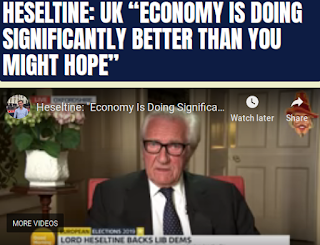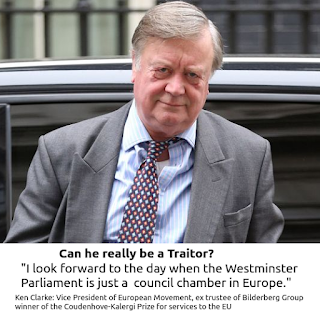Remain supporters are offended by the use of the term “Traitor”. They believe that when, as Kenneth Clarke said, “the Westminster Parliament is just a council chamber in Europe.” [1], the people of Britain will be happy. They do not believe that they are traitors.
Remain supporters assume that the people of the UK will live in greater prosperity in the EU and that this overrides aspirations such as the ability to regulate the environment and sustainability of the UK by controlling laws about migration and hence population density, agriculture, fisheries, industry, transport energy etc.[2]. How can people who believe they are making us richer think they are traitors?
Remain supporters see the integration of UK armed forces into EU armed forces as a necessary transition to face the military threats of the future [3]. How can the removal of the defence forces of a country be the work of traitors?
Leave supporters think that a large proportion of the people in this country are committed to spend their lives in this country. Most people cannot easily move because they have relatives, friends, dependents, local employment and an affection for the landscape, history and culture of their country. They want their government to be focused on the needs of their land. They consider that handing control of their country to people who are not committed to their land, to foreigners, is the action of traitors.
The only reason that Leave supporters have not freely called all Remain supporters “Traitors” in the past is that the Remain supporters have always claimed that they are not handing control to foreigners. Out of politeness the Leave supporters have given Remain supporters the benefit of the doubt, hoping that they would realise that what they are doing is wrong.
 |
| Heseltine, President of the European Movement. Is this really the language of a traitor? |
Remain supporters have been liberal in their use of terms such as “racist”, “xenophobe” and even the Nazi term of derision “little Englanders” for Leave supporters from well before the start of the Referendum campaign. Even senior Remain supporters have used these terms freely. Remain supporters are EU Nationalists, people who wish to replace the Nation of the United Kingdom with an EU Nation. They have transferred allegiance to a foreign power.
So should British people call EU Nationalists “Traitors?”. It is clearly the truth but very confrontational. Certainly if a Remain supporter calls a Leave supporter a “racist” for simply wanting to control their own country the response of “Traitor” is wholly justified.
Even at this late stage it is still conceivable that many Remain supporters are Internationalists who believe that the post WWII dream of a Western dominated global government where we all live in peace and harmony is possible. Having visited China, India, Russia and the Middle East many times I can absolutely assure them that the bulk of the world’s population do not share their dream. The only way forward is mutual respect, not unification. And EU Nationalists should respect the right of those who must make their lives in this country to control it.
“Traitor” is an ugly term because it describes an ugly desire: to hand control of your country to a foreign power. Remain supporters don’t like to hear the truth.
Also see:
Post Referendum: What Brexit Tells us about Britain.
The UK versus the European Movement – who will win?
Definitions of Traitor:
Dictionary.com: a person who commits treason by betraying his or her country.
Miriam Webster: a person who is not loyal to his or her own country, friends, etc. : a person who betrays a country or group of people by helping or supporting an enemy.
etc.
Note 1. “I look forward to the day when the Westminster Parliament is just a council chamber in Europe.” — Kenneth Clarke, Conservative Chancellor in International Currency Review Vol 23 No 4 1996 (original not online but click here or here).
Note 2.The EU already has extensive control of the UK. See EU Competences (largely reproduced below and well worth a quick read) and 80% of EU legislation is no longer subject to veto.
Powers of the EU and UK
Control that is delegated to the UK by the EU but can be taken back without further treaties. This area of control is the shared competences (Article 4 of the TFEU): the EU and EU countries are able to legislate and adopt legally binding acts. EU countries exercise their own competence where the EU does not exercise, or has decided not to exercise, its own competence. Shared competence between the EU and EU countries applies in the following areas:
internal market;
social policy, but only for aspects specifically defined in the Treaty;
economic, social and territorial cohesion (regional policy);
agriculture and fisheries (except conservation of marine biological
resources);
environment;
consumer protection;
transport;
trans-European networks;
energy;
area of freedom, security and justice;
shared safety concerns in public health matters, limited to the aspects
defined in the TFEU;
research, technological development, space;
development cooperation and humanitarian aid.
Total Control: Exclusive competences (Article 3 of the Treaty on the Functioning of the European Union — TFEU) areas in which the EU alone is able to legislate and adopt binding acts. EU countries are able to do so themselves only if empowered by the EU to implement these acts. The EU have exclusive competence in the following areas:
customs union;
the establishing of competition rules necessary for the functioning of the
internal market;
monetary policy for euro area countries;
conservation of marine biological resources under the common fisheries
policy;
common commercial policy;
conclusion of international agreements under certain conditions.
Special competences, especially control of foreign and defence policy
The EU can take measures to ensure that EU countries coordinate their economic, social and employment policies at EU level.
The EU’s common foreign and security policy is characterised by specific institutional features, such as the limited participation of the European Commission and the European Parliament in the decision-making procedure and the exclusion of any legislation activity. That policy is defined and implemented by the European Council (consisting of the Heads of States or Governments of the EU countries) and by the Council (consisting of a representative of each EU country at ministerial level). The President of the European Council and the High Representative of the Union for Foreign and Security Policy represent the EU in matters of common foreign and security policy.
Note 3: Brexit has fully exposed the desire of the EU to replace national defence forces with an EU army. See Parliamentary paper – European Defence: Where is it Heading?.
 Daily Globe British Values, Global Perspective
Daily Globe British Values, Global Perspective





I’m pleased John hasn’t resorted to the parts about the pro remainers lining their pockets hand over fist by staying in the EU . Not saying nothing about the big internationals , just using the UK as a stop gap source of production whilst they set up shop with EU funds in lower cost base new EU states . I mean it would be madness to pay the EU to take the UK apart like that …it would … wouldn’t it ?
A somewhat free-wheeling definition of treason, which is a perfectly good legal term. Persons indulging in this Tweedledumesque abuse of language should pause for thought, and eschew such sophistry. If they persist, it could backfire on them quite hugely one day.
On the contrary, surely, Mr Neville? What definition of treason would you prefer to use? I fear like many others of your ilk, including the disagreeable man from Perth & Perthshire North, irascible language and threats would appear to be a replacement for logical thought. Even in Scotland there are many Brexiteers who view these as traitors. And cowards.
I try to give people the benefit of the doubt in language and do not make accusations of treason, or threats, but like many others in our United Kingdom, my graciousness is wearing a little thin.
And how so, backfire? Surely you cannot mean that in half of the SNP’s seats there were more votes to leave the EU than for the SNP. One wonders if the continued monomania of the SNP is actually awakening other Scots, like myself, to which Political Union truly is a dictatorship of the unelected who plunder Scotland’s waters, of which we must to leave to truly become independent.
Ex-Nat and proud.
I, and all reasonable people, will stick to the definitions in the Treason Acts.
But most people are not lawyers and use the ordinary language of betrayal. In the UK the law of Treason scarcely exists unless there is a state of war or an attack on the crown. The traitor would hardly be as detested as they are if people had solely the legal definition in mind.
There is a rider to this topic.
Treason is one of the most serious offences. It can incur very long sentences of imprisonment.
If you have evidence that somebody has committed treason, you should report it without delay to the appropriate authorities. You should *not* bruit it about, since such an irresponsible act could vitiate important legal proceedings.
If, on the other hand, you do not have evidence that somebody has committed treason, but you ascribe it to an identifiable person, you will have perpetrated a very serious defamation indeed. The consequences for you under Scots Law would be correspondingly serious; under English Law, however, they would be positively catastrophic.
The law of Treason is limited in England as described in Sydenham’s comment above. The penalties are severe but as far as I can see the article is not about the law of Treason, it is about the dictionary definition – the common usage. Remainers are undoubtedly traitors to the settled population of the UK.
Remainers want to remove the power of governance of the UK from the people of this land and hand it to the EU. Remainers are happy that this land should not be ours any more but shared with 500m+ EU residents: they are giving it away.
Tweedledum? What *can* I have been thinking? Humpty Dumpty, of course!
Mea culpa.
Whatever Mr. Kenneth Clarke may be alleged to have *said* about the status of the Westminster Parliament, Mr. Boris Johnson *acted* as if it were a local council.
As it is nothing of the sort, the Courts found against him. He continues to speak and act, however, as if compliance with the Law were for him purely optional. This is worrying.
Clarke is not “alleged” to have said it, he said it, and, of course, being VP of the European Movement he believes it.
The Courts found against the Government on prorogue (Common Law allowed the judiciary to create a new law on prorogation). The Prime Minister then obeyed this judgement immediately.
Your comment is pure innuendo with no substance.
You were misinformed. The law on this matter is as it has always been. In trying to act like Charles I or James II, the Prime Minister broke it. The SC provided an appropriate remedy.
The PM obeyed the Common Law but the law was indeed obscure until the judgement. John Major’s prorogue was not considered illegal but would indeed be so now that the law has been laid down openly.